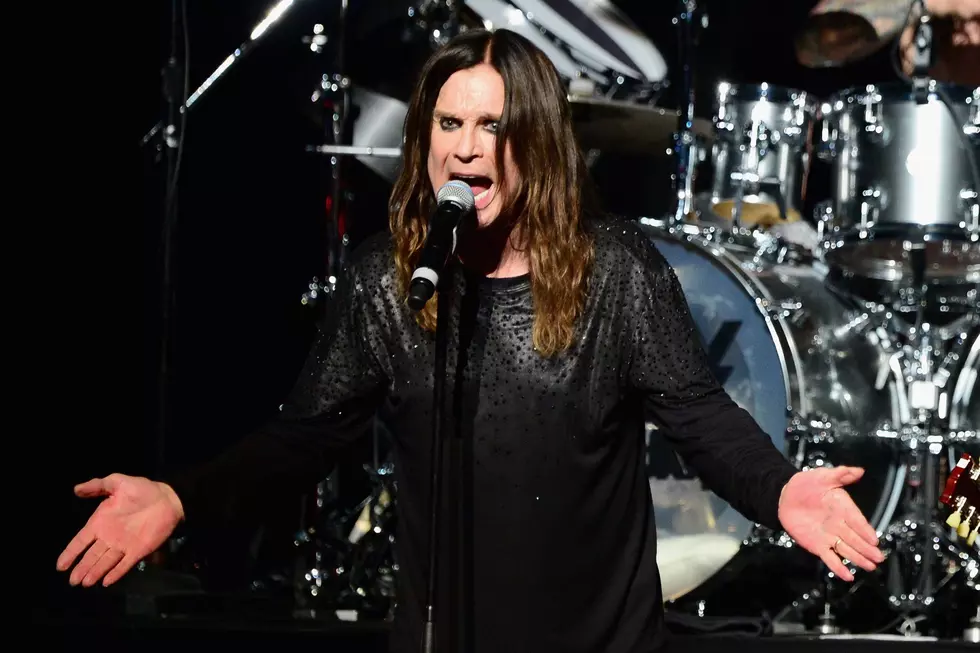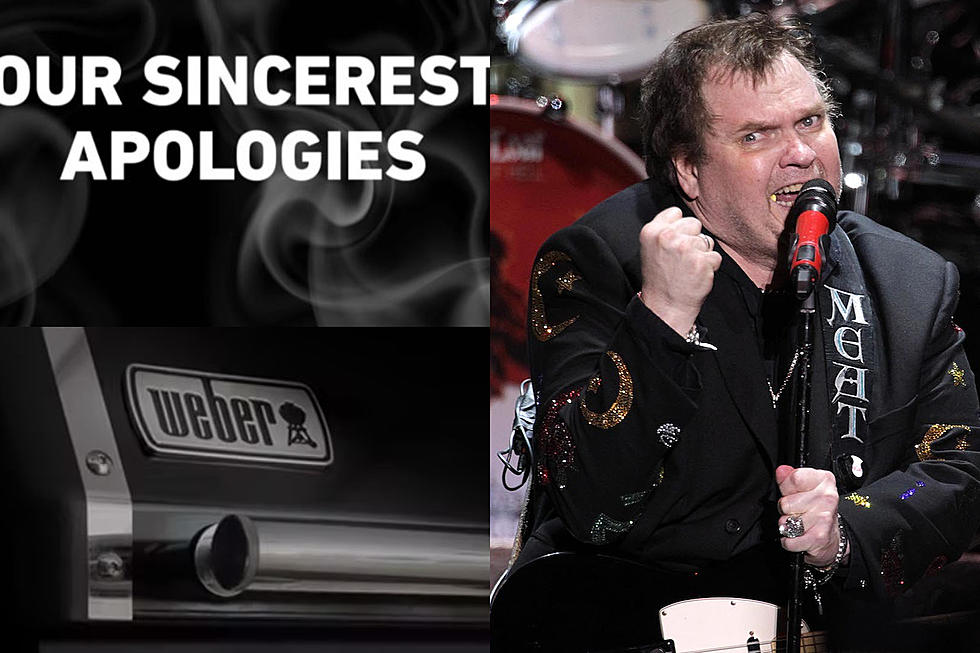
Anthrax’s Scott Ian: Charlie Benante Already Has ‘Killer Riffs’ Ready for Next Album
Anthrax's Scott Ian was the latest guest on Full Metal Jackie's weekend radio program. The guitarist discussed his latest book, Access All Areas: Stories From a Hard Rock Life, which chronicles his adventures on the road and in his personal life spanning from seeing KISS for the first time during his childhood through more recent events. During the conversation, he spoke about how his relationship with touring has changed over the decades, the beginnings of writing new material for the successor to For All Kings and more. Check out the chat below.
How ya doing?
Good, hey, how are ya?
Lots going on as usual. Obviously, the Kilthrax tour and you've got a new book, it's called Access All Areas: Stories from a Hard Rock Life. It's a collection of stories about yourself and other people in rock 'n' roll. What were you guidelines on which stories to include and which stories to leave out?
It's a good question because I guess I had more than I needed as far as ideas go. I had a pretty long list of story ideas sometimes some more realized than others. With an actual title or even a couple of chapters written sometimes I would go through this list and it would just say “Kirk’s house," just things that I had written down over the last few years. When I was working on the first book, the autobiography, there were a lot of stories that I knew that were great stories but they weren't going to fit into the flow of the autobiography. It would be like going to see a movie and you're really into the plot and then there's like this 20 minute tangent and you're like, "What, what, why are we over here now?"
People have also asked, "Well why weren't these stories in your first book?" Well then the first book would have been 800 pages and that's not going to work. And they all really don't serve the story of an autobiography. All the stories in this new book — and there’s 23 of them — they stand alone like short stories. So I think they serve their purpose much better this way just having been written as short stories. It's not done as a novel — certainly some of them may be connected here and there — but there are 23 stories from my life that really I find quite funny and I'm hoping other people will as well.
Scott, you're an author and you also do spoken word performances too. In what ways does spoken word make you a better storyteller when it came time to write your new book?
I don't know that it has because they're so different and they're so separate. I thought it was going to help a lot more than it did if at all. Having done the talking shows you learn how to tell a story in front of an audience by doing it and really learning how to squeeze every ounce of energy out of a sentence, out of a word, literally out of a syllable to get a reaction. And that's it, but it only works with that.
I then sit down and write a story. The skills I've learned how to tell a story in front of a crowd don't necessarily translate into writing because you don't have your body standing there onstage being physical. So much of storytelling is physicality onstage and dynamics in your speech and you then have to learn how to do that with words and put dynamics into sentences and paragraphs and chapters and try and get the physicality across through your words, through the power of writing.
So it's such a completely different thing. And again it's also something that as you do it you learn because I’m lucky enough I get to work with an editor. So when I send him stuff, he'll be telling me, "That's great, I see what you did there." You just learn how to do it. You learn how to write the story rather than tell the story and have the same effect at the end.
Nuclear Blast are re-releasing a pair of albums from when John Bush and Rob Caggiano were in Anthrax. What are your favorite memories of making We've Come For You All and The Greater of Two Evils?
I know they re-releasing those but those are — actually I know there was something online but that was all wrong schedule wise. They're not being released when they said they were going to be released. I'm pretty sure that all got pushed back.
But to answer your question, my favorite memories of making those two records... Well, The Greater of Two Evils was cool because we did it in front of an audience in the studio and that’s something that we’ve never done before. Granted, we weren’t recording new songs for a new studio album. It was like making a live record but not making a live record if that makes any sense at all. Because we brought, I don’t remember if they were contest winners or what the story was but there were 40 or 50 people that got to be in the room while we were recording that record and the energy of that was really cool.
I've said it before, it would be amazing if you could take an audience from South America and bring them into a room while you're making a record and being able to work with that energy in the room. So that's what this kind of did for us. Since we were going to be playing songs we had obviously been playing for a long time, we just felt like, maybe it'll be a good idea to bring some people in and just ramp up the energy while we were doing this. I think it worked. It definitely sounds live, because it is [laughs].
We've Come For You All — that record was for us. It very easily could have been our last record. Going into that album after just the chaos of the years before it, with Volume 8 coming out and then the label going out of business and basically throwing it in the garbage. We just did everything we could over the years between 1998 and 2002 or 2003. Those four or five years we just did everything we could to stay busy and work and to keep things moving forward. But the idea of getting together and writing another album, to only see it possibly get thrown in the trash by a label that was just too much to deal with.
That's why there was a pretty good break between there, we kind of just lost our faith in - not Anthrax, but everything around us and even just the way the business worked. You make a record and you expect people to be able to get it, not just have a label say "sorry" and then you still can't get that Volume 8 record in most places. So going into We've Come For You All, we certainly were treading very lightly as a band, but then you start writing songs and it starts coming together like every other record and you start feeling really happy with the material and we felt like we had a great record. Of course hindsight looking back on it, we did have a great record. It was the record we needed in that moment to essentially put us back on the map. I really love that album.
Scott, in a world that loves AC/DC you might be the biggest Malcolm Young fan. What aspects of your playing are directly influenced by Malcolm and how hard did his passing affect you?
I don’t want to sound weird, but it wasn't a shock. People knew, I knew that he had been sick for along time with a disease that generally you don't come back from. It was one of these, it was just a matter of time things, which is just a huge bummer. I had actually talked to a friend of mine at the Loudwire Awards who is very close with the AC/DC camp just to ask if he had heard anything. There's no information out there, there was never information on how Malcolm was doing. He said he had spoken to someone and from what he had heard he didn't have long and that was about three weeks before he passed.
So, I wasn't surprised but at the same time that doesn't temper how sad it was and what a huge bummer it is that that guy is no longer with us doing what he pretty much was put on this planet to do. But I'm the type of person that celebrates people when they go. I don’t sit around and do the whole mourning thing and all that. I prefer to celebrate it, we cranked AC/DC — we put Let There Be Rock on and just cranked it and that's what I've always done. It's never going to change, so we'll have all of those records for the rest of my life, obviously. Anytime I think about Malcolm I can go put something on.
As far as my playing goes, he was my guitar teacher. Obviously I wasn't sitting there taking lessons from him, but playing along to AC/DC records is really where I learned how to play guitar. And I would just go song by song and learn the chords and not take the time to sit there and learn the lead breaks because learning the leads would take me days. Whereas I could learn the whole album in a few hours if I was just learning the chords. And Malcolm was the guy playing the chords and it just — I think my whole way of playing, my percussive right hand. It's very very similar in a lot of ways to what he does. Obviously I play a different style of music and the metal Anthrax is playing is a completely different style of music than AC/DC. So even though my right hand is very percussive like his, it's in a different way with palm muting and obviously playing the guitar to make a sound that works in the context of Anthrax. But it all comes from what he was doing.
What do you enjoy about touring now that maybe you didn't really appreciate when you were younger?
Good question. Certainly not the travel part. When I was younger, the travel part was - I really didn't care so much. The traveling part, I hate the traveling part. I think Alice Cooper famously said a long time ago, "They don't pay me to play, they pay me to travel." There's a lot of cities around the world that I know, we've been a lot of places a lot of times over 30 odd years. So I have a lot regular spots and I definitely enjoy that more. Certainly in the '80s when we were going places most of the time it was the first time, so I didn't know anything. So now if I'm going to Paris I know what I want to go see and I know where I want to go eat, or wherever in the world. I look forward to hitting regular spots, certainly, when I'm on tour.
In a weird way, and I know this might sound really strange, but I think I appreciate the shows more now after all these years because we're still doing it and we still get to do this. Playing live, being onstage, that's a privilege and the fact that audiences still want to come out and see what we do, that means everything to me. So, I think — not like I was taking things for granted when I was younger, but I was just younger. I was all over the place. So getting to do this now after all these years and at the level we get to do things and the amazing audiences we get to play in front of, I think I really appreciate the actual time onstage more than I ever have.
Scott, the last two Anthrax albums: Worship Music and For All Kings are some of your best work. How much are you thinking about, or even already working on the next album?
Slowly but surely, [laughs]. The door is open as far as moving forward, Charlie has sent out some really killer ideas. Killer riffs. I know because I've heard them. Really exciting. We go through the same thing every time. Going back to the first record. It's always like that, it's the same thing every time. You finish a record and it comes out, then you go on tour for two years and play shows and eventually you start thinking about what is next. I always get the same thought every time, "What if that's it? What if we used it all up? What if all the magic is gone? [laughs] What if there's no riffs left? We've used up our quota."
Is there a quota of riffs?
Yeah, we've used up our quota, every band gets a quota. That's why certain bands either stop making records or their records start to suck because they used up their quota of riffs. I like to think that way. But hey, we've been just - I can't say lucky because it's not luck. Charlie is a great writer. Charlie writes great riffs. I still have ideas too and Frankie has great ideas as well, but Charlie is kind of our catalyst when it comes to the music side of it.
He's already sent over some really killer stuff and it already calmed down any anxiety or nerves I've had over possibly using our quota, because we've got killer ideas and it makes me excited to know that at some point next year we're gonna get in a room and start banging out new stuff again. We're weird like that, we love writing new songs, we love new material, we're never going to be a band that's just going to rest on their catalog and go out and play the so called hits over and over again. If we're not moving forward in some way, and doing something to satisfy our creative itch, then there's no point really to do this. It just wouldn't be fun anymore.
The fact that we're still creating stuff that we love, and people around the world seem to agree with us, especially on these last two records, so obviously it puts us in a real good place and makes me know at least for the next few years, there's a lot of awesome metal coming.
Thanks to Scott Ian for the interview. You can grab your copy of 'Access All Areas: Stories From a Hard Rock Life' here. Be sure to follow Anthrax on Facebook to keep up with everything the band is doing and find out where you can hear Full Metal Jackie’s weekend show at this location.
That Time Scott Ian Got Arrested With Metallica's Cliff Burton
Anthrax Albums Ranked
More From KFMX FM







